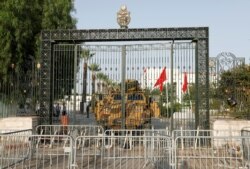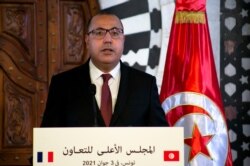Tunisia's president, Kais Saied, was accused of staging a coup this week, when he dismissed the prime minister and suspended parliament after violent protests. Clashes between Saied's supporters, protesters, and police have raised fears that Tunisia's fragile democracy is under threat.
A nationwide, dusk-to-dawn curfew began in Tunisia Tuesday and no more than three people are allowed to gather in public places.
The move comes two days after Tunisian President Kais Saied fired Prime Minister Hichem Mechichi and suspended parliament for 30 days.
To justify the prime minister's firing and shutting the parliament, Saied cited Article 80 of the constitution, which he said gave him the power to carry out such a decision.
Opponents are calling that decision a coup.
Marc Owen Jones, a professor at Qatar's Hamad bin Khalifa University, told VOA the president planned this moment for months.
“This policy or what he is doing reflects the content of a document that was leaked back in May that basically suggested that the president should consolidate his own power by issuing the measures we have seen in the past two days. And this policy is certainly supported by certain countries in the Middle East, which includes Saudi Arabia and the United Arab Emirates governments in particular,” he said.
Jones said the Tunisian leader is following the footsteps of other rulers who ruled with an iron fist.
“The president is consolidating power in his hands and is threatening anyone who engages in violence will get bullets. He has not learnt the lessons of Arab uprising, which is that most people in the region don’t want authoritarian leaders who basically concentrate violent powers in their hands and threaten the population with violence. This is a huge significant moment in the middle east that represents an infringement of authoritarian rule once again," he said.
President Saied was elected in 2019. The election that year was the second free presidential vote in the north African nation. The electorate hoped he would improve their lives and move the country forward.
The developments Sunday came after months of wrangling between the president and Prime Minister Mechichi. A parliamentary coalition led by the biggest political party, Ennahdha, supported the prime minister.
On Monday, the military sealed off the parliament building and supporters of the president and Ennahdha clashed outside.
On Tuesday, Ennahdha called for dialogue to end the political crisis. The party said there is a need to preserve democratic gains and return the country to constitutional order.
Mohamed-Dhia Hammami is a political science researcher based in Tunis. He said Tunisia can solve its problem.
“We still have what we call a national organization, mostly a strong and powerful labor union UGTT, that can play the role of a mediator for Kais Saied and the others. Yesterday, [there were] calls from one of the quartet members of the 2013 mediation calling for national dialogue, and calling for similar mediation between Kais Saied, the president and Rached Ghannouchi, the head of the Ennahdha and the head of the parliament. So that might be an option,” he said.
In 2013, Tunisia’s National Dialogue Quartet helped resolve the political crisis, their effort won them the 2015 Nobel Peace Prize.
However, some experts fear the current political crisis may end in an impasse and a standoff, leading to a conflict.
Hammami said the president cannot hold power that long.
“I don’t think it will be dark as Syria or Egypt or Yemen but I think that we are facing a risk of the authoritarian term. But at the same time, we should keep in mind that the current president Kais Saied is an outsider to the system, his understanding of the complexity of things is limited. He doesn’t have the political party that allows him to govern the country like Bin Ali did, the former dictator. And a significant part of the establishment and political elite are opposing or at least skeptical of his recent moves,” he said.
Tunisia has achieved democracy in recent years, but the country has struggled with high unemployment, corruption and slow economic growth.













